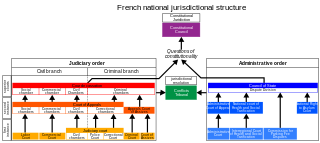Related Research Articles

English law is the common law legal system of England and Wales, comprising mainly criminal law and civil law, each branch having its own courts and procedures.

A directive is a legal act of the European Union that requires member states to achieve particular goals without dictating how the member states achieve those goals. A directive's goals have to be made the goals of one or more new or changed national laws by the member states before this legislation applies to individuals residing in the member states. Directives normally leave member states with a certain amount of leeway as to the exact rules to be adopted. Directives can be adopted by means of a variety of legislative procedures depending on their subject matter.
In law, codification is the process of collecting and restating the law of a jurisdiction in certain areas, usually by subject, forming a legal code, i.e. a codex (book) of law.

Legal history or the history of law is the study of how law has evolved and why it has changed. Legal history is closely connected to the development of civilisations and operates in the wider context of social history. Certain jurists and historians of legal process have seen legal history as the recording of the evolution of laws and the technical explanation of how these laws have evolved with the view of better understanding the origins of various legal concepts; some consider legal history a branch of intellectual history. Twentieth-century historians viewed legal history in a more contextualised manner – more in line with the thinking of social historians. They have looked at legal institutions as complex systems of rules, players and symbols and have seen these elements interact with society to change, adapt, resist or promote certain aspects of civil society. Such legal historians have tended to analyse case histories from the parameters of social-science inquiry, using statistical methods, analysing class distinctions among litigants, petitioners and other players in various legal processes. By analyzing case outcomes, transaction costs, and numbers of settled cases, they have begun an analysis of legal institutions, practices, procedures and briefs that gives a more complex picture of law and society than the study of jurisprudence, case law and civil codes can achieve.
The Bürgerliches Gesetzbuch, abbreviated BGB, is the civil code of Germany, codifying most generally-applicably private law. In development since 1881, it became effective on 1 January 1900, and was considered a massive and groundbreaking project.

Civil law is a legal system originating in Italy and France and adopted in much of the world. The civil law system is intellectualized within the framework of Roman law and French civil law, and with core principles codified into a referable system, which serves as the primary source of law. The civil law system is often contrasted with the common law system, which originated in medieval England. Whereas the civil law takes the form of legal codes, the law in common law systems historically came from uncodified case law that arose as a result of judicial decisions, recognising prior court decisions as legally binding precedent.

Contra proferentem, also known as "interpretation against the draftsman", is a doctrine of contractual interpretation providing that, where a promise, agreement or term is ambiguous, the preferred meaning should be the one that works against the interests of the party who provided the wording.

UNIDROIT is an intergovernmental organization whose objective is to harmonize private international law across countries through uniform rules, international conventions, and the production of model laws, sets of principles, guides and guidelines. Established in 1926 as part of the League of Nations, it was reestablished in 1940 following the League's dissolution through a multilateral agreement, the UNIDROIT Statute. As of 2023 UNIDROIT has 65 member states.

The United Nations Convention on Contracts for the International Sale of Goods (CISG), sometimes known as the Vienna Convention, is a multilateral treaty that establishes a uniform framework for international commerce. As of May 2023, it has been ratified by 95 countries, representing two-thirds of world trade.

French law has a dual jurisdictional system comprising private law, also known as judicial law, and public law.
The law of Germany, that being the modern German legal system, is a system of civil law which is founded on the principles laid out by the Basic Law for the Federal Republic of Germany, though many of the most important laws, for example most regulations of the civil code were developed prior to the 1949 constitution. It is composed of public law, which regulates the relations between a citizen/person and the state or two bodies of the state, and the private law, (Privatrecht) which regulates the relations between two people or companies. It has been subject to a wide array of influences from Roman law, such as the Corpus Juris Civilis, to Napoleonic law, such as the Napoleonic Code.
Lex mercatoria, often referred to as "the Law Merchant" in English, is the body of commercial law used by merchants throughout Europe during the medieval period. It evolved similar to English common law as a system of custom and best practice, which was enforced through a system of merchant courts along the main trade routes. It developed into an integrated body of law that was voluntarily produced, adjudicated and enforced on a voluntary basis, alleviating the friction stemming from the diverse backgrounds and local traditions of the participants. Due to the international background local state law was not always applicable and the merchant law provided a leveled framework to conduct transactions reducing the preliminary of a trusted second party. It emphasized contractual freedom and inalienability of property, while shunning legal technicalities and deciding cases ex aequo et bono. With lex mercatoria professional merchants revitalized the almost nonexistent commercial activities in Europe, which had plummeted after the fall of the Roman Empire.

Canadian contract law is composed of two parallel systems: a common law framework outside Québec and a civil law framework within Québec. Outside Québec, Canadian contract law is derived from English contract law, though it has developed distinctly since Canadian Confederation in 1867. While Québecois contract law was originally derived from that which existed in France at the time of Québec's annexation into the British Empire, it was overhauled and codified first in the Civil Code of Lower Canada and later in the current Civil Code of Quebec, which codifies most elements of contract law as part of its provisions on the broader law of obligations. Individual common law provinces have codified certain contractual rules in a Sale of Goods Act, resembling equivalent statutes elsewhere in the Commonwealth. As most aspects of contract law in Canada are the subject of provincial jurisdiction under the Canadian Constitution, contract law may differ even between the country's common law provinces and territories. Conversely; as the law regarding bills of exchange and promissory notes, trade and commerce, maritime law, and banking among other related areas is governed by federal law under Section 91 of the Constitution Act, 1867; aspects of contract law pertaining to these topics are harmonised between Québec and the common law provinces.
European tort law, as a term, is not strictly defined and is used to describe a number of various features concerning tort law in Europe. The concept developed alongside other major historic developments of European integration.
The European civil code (ECC) is a proposed harmonisation of private law across the European Union.

The Civil Code of California is a collection of statutes for the State of California. The code is made up of statutes which govern the general obligations and rights of persons within the jurisdiction of California. It was based on a civil code originally prepared by David Dudley Field II for the state of New York. It is one of the 29 California Codes and was among the first four enacted in 1872.
International Commercial Law is a body of legal rules, conventions, treaties, domestic legislation and commercial customs or usages, that governs international commercial or business transactions. A transaction will qualify to be international if elements of more than one country are involved.

A contract is an agreement that specifies certain legally enforceable rights and obligations pertaining to two or more mutually agreeing parties. A contract typically involves the transfer of goods, services, money, or a promise to transfer any of those at a future date, and the activities and intentions of the parties entering into a contract may be referred to as contracting. In the event of a breach of contract, the injured party may seek judicial remedies such as damages or rescission. A binding agreement between actors in international law is known as a treaty.

Justice Jean-Paul Beraudo is a lawyer, academic and author of legal works. He was Justice at the French Supreme Court and vice-chairman of the International Court of Arbitration. He lectures on International Private Law and International Trade Law at Panthéon-Sorbonne University and on Company law at Sciences-Po, Paris. The International Institute for the Unification of Private Law (UNIDROIT) appointed him correspondent for France and a member of the scientific committee.
The Principles of International Commercial Contracts 2016 is a set of 211 rules for international contracts. They have been drawn up since 1984 by an international working group of the inter-governmental organization UNIDROIT, and they were ratified by its Council representing 64 governments of member states.
References
- ↑ Ole, Lando; Hugh, Beale (2000). Principles of European Contract Law, Parts I and II, prepared by the Commission on European Contract Law. p. XXVII.
- ↑ Copenhagen Business School, In memory of Ole Lando, accessed 16 September 2023
- ↑ Smits, Jan (1998). "A European Private Law as a Mixed Legal System" (PDF). Maastricht Journal of European and Comparative Law. 5 (4): 328–340. doi:10.1177/1023263X9800500402. S2CID 145363652.
- ↑ Ole, Lando; Hugh, Beale (2000). Principles of European Contract Law, Parts I and II, prepared by the Commission on European Contract Law. p. XXIV.
- ↑ Castronovo, Carlo (1997). Contract and the Idea of Codification in The Principles of European Contract Law (in Festskrift til Ole Lando. pp. 109–124.
- ↑ Ole, Lando; Hugh, Beale (2000). Principles of European Contract Law, Parts I and II, prepared by the Commission on European Contract Law. p. XXIII.
- ↑ Ole, Lando; Hugh, Beale (2000). Principles of European Contract Law, Parts I and II, prepared by the Commission on European Contract Law. p. XXIV.
- ↑ Ole, Lando; Hugh, Beale (2000). Principles of European Contract Law, Parts I and II, prepared by the Commission on European Contract Law. p. XXIII.
- ↑ Lando, Ole. Some Features of the Law of Contract in the Third Millenium, ch. III 22 A. "Lists of literature". cbs.dk. Archived from the original on 19 November 2003. Retrieved 28 June 2011.
- ↑ "Consumer contract law". europa.eu.
- ↑ "Ein europäisches Vertragsrecht kommt - aber zu welchem Preis?" [A European contract law comes - but at what price?]. Frankfurter Allgemeine Zeitung (in German). 1 July 2010. Retrieved 1 September 2017.